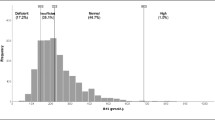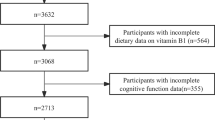Abstract
Objective
Apolipoprotein E4 (APOE4) genotype has been implicated as a moderating factor in cognitive function studies. Although prior studies have suggested that vitamin C is associated with better cognitive function in elders, link between the two has been mixed. Limited data exist as to whether the APOE4 genotype influences these associations. Therefore, this study sought to determine whether the association between vitamin C and cognition in a rural community dwelling cohort differs by the APOE4 genotype.
Design and Participants
Data were analyzed on 582 participants (n=183 men; n=399 women) from a rural community-based cohort. Cognition was assessed using the Repeatable Battery for the Assessment of Neuropsychological Status and The Executive Interview. APOE genotyping was ascertained by standard methods. The relation between vitamin C supplementation and cognition were analyzed first with ANOVA and then ANCOVA with age, gender, education as covariates. Analyses were initially run in the full sample and then split by APOE4 presence (yes/no).
Results
Overall, Vitamin C supplementation was associated with significantly better immediate memory (p=0.04), visuospatial skills (p=0.002), language (p=0.01), and global cognitive functioning (p=0.006). Among APOE4 non-carriers, vitamin C supplementation was positively associated with immediate memory (F[1,392] =6.7, p=0.01), visuospatial skills (F[1,391]=10.6, p=0.001), language (F[1,392]=13.0, p<0.001), attention (F[1,386]=7.9, p=0.005, and global cognition (F[1,382]=11.0, p=0.001. However, there was no significant link between vitamin C supplementation and cognition among APOE4 carriers.
Conclusion
Vitamin C supplementation was found to be positively associated with cognition among this rural-dwelling community-based sample; however, the associations appeared to differ by APOE4 status. These data may suggest that targeted genotype-specific cognitive enhancement studies are needed to clarify the potential benefits of vitamin C supplementation.


Similar content being viewed by others
References
Hansen SN, Tveden-Nyborg P, Lykkesfeldt J. Does vitamin C deficiency affect cognitive development and function? Nutrients 2014 Sep 19;6(9):3818–3846.
Tveden-Nyborg P, Johansen LK, Raida Z, Villumsen CK, Larsen JO, Lykkesfeldt J. Vitamin C deficiency in early postnatal life impairs spatial memory and reduces the number of hippocampal neurons in guinea pigs. Am J Clin Nutr 2009 Sep;90(3):540–546.
Foy CJ, Passmore AP, Vahidassr MD, Young IS, Lawson JT. Plasma chain-breaking antioxidants in Alzheimer’s disease, vascular dementia and Parkinson’s disease. QJM 1999 Jan;92(1):39–45.
Grodstein F, Chen J, Willett WC. High-dose antioxidant supplements and cognitive function in community-dwelling elderly women. Am J Clin Nutr 2003 Apr;77(4):975–984.
Morris MC, Beckett LA, Scherr PA, Hebert LE, Bennett DA, Field TS, et al. Vitamin E and vitamin C supplement use and risk of incident Alzheimer disease. Alzheimer Dis Assoc Disord 1998 Sep;12(3):121–126.
Morris MC, Evans DA, Bienias JL, Tangney CC, Bennett DA, Aggarwal N, et al. Dietary intake of antioxidant nutrients and the risk of incident Alzheimer disease in a biracial community study. JAMA 2002 Jun 26;287(24):3230–3237.
Engelhart MJ, Geerlings MI, Ruitenberg A, van Swieten JC, Hofman A, Witteman JC, et al. Dietary intake of antioxidants and risk of Alzheimer disease. JAMA 2002 Jun 26;287(24):3223–3229.
Riviere S, Birlouez-Aragon I, Nourhashemi F, Vellas B. Low plasma vitamin C in Alzheimer patients despite an adequate diet. Int J Geriatr Psychiatry 1998 Nov;13(11):749–754.
Arlt S, Muller-Thomsen T, Beisiegel U, Kontush A. Effect of one-year vitamin C- and E-supplementation on cerebrospinal fluid oxidation parameters and clinical course in Alzheimer’s disease. Neurochem Res 2012 Dec;37(12):2706–2714.
Galasko DR, Peskind E, Clark CM, Quinn JF, Ringman JM, Jicha GA, et al. Antioxidants for Alzheimer disease: a randomized clinical trial with cerebrospinal fluid biomarker measures. Arch Neurol 2012 Jul;69(7):836–841.
Blacker D, Haines JL, Rodes L, Terwedow H, Go RC, Harrell LE, et al. ApoE-4 and age at onset of Alzheimer’s disease: the NIMH genetics initiative. Neurology 1997 Jan;48(1):139–147.
Chaudhari K, Wong JM, Vann PH, Sumien N. Exercise training and antioxidant supplementation independently improve cognitive function in adult male and female GFAP-APOE mice. Journal of Sport and Health Science 2014 9;3(3):196–205.
Fotuhi M, Zandi PP, Hayden KM, Khachaturian AS, Szekely CA, Wengreen H, et al. Better cognitive performance in elderly taking antioxidant vitamins E and C supplements in combination with nonsteroidal anti-inflammatory drugs: the Cache County Study. Alzheimers Dement 2008 May;4(3):223–227.
Johnson LA, Cushing B, Rohlfing G, Edwards M, Davenloo H, D’Agostino D, et al. The Hachinski ischemic scale and cognition: the influence of ethnicity. Age Ageing 2014 May;43(3):364–369.
O’Bryant SE, Johnson L, Balldin V, Edwards M, Barber R, Williams B, et al. Characterization of Mexican Americans with mild cognitive impairment and Alzheimer’s disease. J Alzheimers Dis 2013;33(2):373–379.
O’Bryant SE, Johnson L, Reisch J, Edwards M, Hall J, Barber R, et al. Risk factors for mild cognitive impairment among Mexican Americans. Alzheimers Dement 2013 Nov;9(6):622–631.e1.
Randolph C, Tierney MC, Mohr E, Chase TN. The Repeatable Battery for the Assessment of Neuropsychological Status (RBANS): preliminary clinical validity. J Clin Exp Neuropsychol 1998 Jun;20(3):310–319.
Duff K, Humphreys Clark JD, O’Bryant SE, Mold JW, Schiffer RB, Sutker PB. Utility of the RBANS in detecting cognitive impairment associated with Alzheimer’s disease: sensitivity, specificity, and positive and negative predictive powers. Arch Clin Neuropsychol 2008 Sep;23(5):603–612.
Royall DR, Mahurin RK, Gray KF. Bedside assessment of executive cognitive impairment: the executive interview. J Am Geriatr Soc 1992 Dec;40(12):1221–1226.
Lyketsos CG, Szekely CA, Mielke MM, Rosenberg PB, Zandi PP. Developing new treatments for Alzheimer’s disease: the who, what, when, and how of biomarkerguided therapies. Int Psychogeriatr 2008 Oct;20(5):871–889.
Paleologos M, Cumming RG, Lazarus R. Cohort study of vitamin C intake and cognitive impairment. Am J Epidemiol 1998 Jul 1;148(1):45–50.
Juan W, Lino M. U.S. Department of Agriculture and Center for Nutrition Policy and Promotion Fruit and vegetable consumption by older Americans. Nutrition Insight 2007 March;34.
Gale CR, Martyn CN, Cooper C. Cognitive impairment and mortality in a cohort of elderly people. BMJ 1996 Mar 9;312(7031):608–611.
Zamani M, Katebi M, Mehdizadeh M, Kafami L, Soleimani M. Combination therapy with A1 receptor agonist and vitamin C improved working memory in a mouse model of global ischemia-reperfusion. Basic Clin Neurosci 2013 Spring;4(2):111–116.
Sirasanagandla SR, Rooben RK, Rajkumar, Narayanan SN, Jetti R. Ascorbic Acid ameliorates nicotine exposure induced impaired spatial memory performances in rats. West Indian Med J 2014 Aug;63(4):318–324.
Zandi PP, Anthony JC, Khachaturian AS, Stone SV, Gustafson D, Tschanz JT, et al. Reduced risk of Alzheimer disease in users of antioxidant vitamin supplements: the Cache County Study. Arch Neurol 2004 Jan;61(1):82–88.
Kara Y, Doguc DK, Kulac E, Gultekin F. Acetylsalicylic acid and ascorbic acid combination improves cognition; via antioxidant effect or increased expression of NMDARs and nAChRs? Environ Toxicol Pharmacol 2014 May;37(3):916–927.
Miyata M, Smith JD. Apolipoprotein E allele-specific antioxidant activity and effects on cytotoxicity by oxidative insults and beta-amyloid peptides. Nat Genet 1996 Sep;14(1):55–61.
Author information
Authors and Affiliations
Corresponding author
Rights and permissions
About this article
Cite this article
Chaudhari, K., Sumien, N., Johnson, L. et al. Vitamin C supplementation, APOE4 genotype and cognitive functioning in a rural-dwelling cohort. J Nutr Health Aging 20, 841–844 (2016). https://doi.org/10.1007/s12603-016-0705-2
Received:
Accepted:
Published:
Issue Date:
DOI: https://doi.org/10.1007/s12603-016-0705-2




